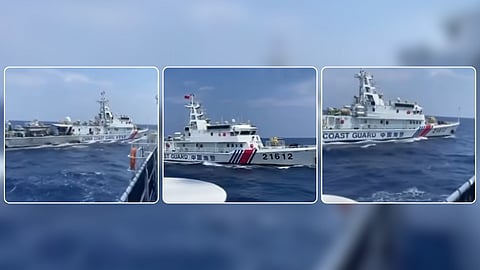
- NEWS
- the EDIT
- COMMENTARY
- BUSINESS
- LIFE
- SHOW
- ACTION
- GLOBAL GOALS
- SNAPS
- DYARYO TIRADA
- MORE

A Philippine Coast Guard (PCG) vessel was “dangerously blocked” by a Chinese vessel near Panatag (Scarborough) Shoal, escalating tensions anew in the West Philippine Sea. This incident comes as a separate Chinese research ship, the Zhong Shan Da Xue, which had previously raised alarms for allegedly conducting unauthorized marine surveys near Batanes, was spotted again on Tuesday off the coast of Zambales.
Commodore Jay Tarriela, PCG spokesperson for the West Philippine Sea (WPS), confirmed that the BRP Cabra is “actively patrolling off the coast of Zambales to thwart attempts” by the China Coast Guard (CCG) to illegally patrol and assert presence within the Philippines’ exclusive economic zone. These patrols are part of the PCG’s routine mission to maintain maritime domain awareness and defend national interests in contested waters.
“Despite the Cabra being smaller compared to the CCG vessels, PCG Commandant Admiral Ronnie Gil Gavan asserted that international law empowers our vessel to operate without intimidation,” Tarriela emphasized.
“This confidence allowed the BRP Cabra to challenge the China Coast Guard, thereby exposing their unruly behavior and bullying tactics to the international community,” he added, underlining the symbolic and strategic value of even smaller Philippine vessels standing up to foreign incursions.
Tarriela explained that the PCG’s patrols are not only sovereign exercises but also grounded in international legal frameworks. These include the United Nations Convention on the Law of the Sea, which defines the rights and responsibilities of nations with respect to their use of the world’s oceans, the 2016 Arbitral Award which invalidated China’s sweeping nine-dash line claims, and the recently enacted Philippine Maritime Zones Act which further delineates the country’s maritime entitlements.
He said that CCG vessel 21612 executed another set of dangerous maneuvers against the BRP Cabra while it was navigating 67 kilometers west of Panatag Shoal — an area well within the Philippine EEZ.
“Yesterday, in the vicinity of Capon Grande, Zambales, the CCG 21612 increased its speed and maneuvered past the port side of the Cabra, dangerously blocking its way,” Tarriela recounted. Such actions not only risked a maritime collision but were also in clear violation of the International Regulations for Preventing Collisions at Sea, which sets out navigation rules to ensure safety at sea.
He stressed that the conduct of the Chinese vessel reflects “a blatant disregard for safety at sea.” Tarriela pointed out that while coast guards are globally recognized as entities that ensure maritime safety and carry out humanitarian operations, the People’s Republic of China has repeatedly shown a deviation from these norms. “Their illegal patrols jeopardize the lives of our fishermen and our legitimate law enforcement agents alike,” he warned.
In a parallel operation, the PCG deployed its Islander 4177 surveillance aircraft to monitor the Chinese research vessel Zhong Shan Da Xue, which was again spotted illegally operating around 78.21 nautical miles northeast of Itbayat, Batanes. This is the same ship that had previously been detected in the area earlier this month and suspected of conducting marine scientific research without Philippine authorization — a clear violation of the country’s sovereign rights over its EEZ.
“The crew of the PCG Islander attempted to establish radio communication with the vessel multiple times but there was no response,” Tarriela said, suggesting deliberate evasion and a lack of transparency on the part of the Chinese crew.
Tarriela lambasted the Chinese for repeatedly conducting marine scientific research within Philippine waters without permission. Such activities are regulated under international law and typically require the consent of the coastal state — in this case, the Philippines.
According to the PCG, the Zhong Shan Da Xue entered the country’s EEZ on 2 April, off the coast of Batanes, and remained in the northeastern part of Philippine waters until 8 April. Its return just days later has raised suspicions of continued covert survey activities or persistent assertion of presence by China in the country’s maritime domain.
These latest incidents underscore the growing frequency and boldness of China’s activities in the West Philippine Sea, putting pressure on Philippine maritime forces to continue asserting sovereignty amid international support for the 2016 arbitral ruling.
